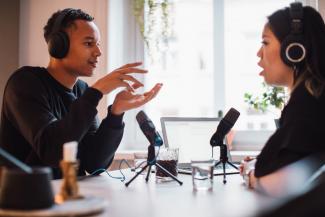
Do the preparation task first. Then listen to the audio and do the exercises.
Preparation
Transcript
Presenter: So, today's expert teacher is Gabriella, a university English teacher from Leeds. Gabriella, hi and thanks for joining us today.
Gabriella: Thanks for having me!
Presenter: So, I have to confess today's topic is something I am really bad at: listening. Most people say speaking is the most stressful part of learning a new language but, for me, with my B1 German, speaking isn't so bad. At least I'm in control of it. But listening … woah … people speak so fast and it's like my brain just shuts down. Am I just really strange and bad at listening? Tell me, honestly, I can take it.
Gabriella: No, you're not strange. In fact, it's really common. You know, in exams most people do pretty well in speaking compared with listening. Of course, exams are a different situation from real life because in an exam you can't ask for something to be repeated or explained. You usually have just one or maybe two opportunities to listen to the dialogue and then it's gone.
Presenter: Right, but in real life I feel stupid always saying, 'Sorry, can you repeat that, please?', especially if I still don't understand even when they repeat it. And people out there listening, I hope you don't do this – quite often the person just repeats what they said equally as fast and I'm still lost!
Gabriella: They do, don't they? In real life, you've got two strategies. One is to pretend to understand and get out of the conversation as fast as you can.
Presenter: Yep, sounds familiar!
Gabriella: But, obviously that's not going to help if it's a conversation with high stakes. It might have important consequences. I mean, if you're just chatting with a stranger at the bus stop, it doesn't matter. But imagine you're at a government office or a bank, trying to find out what paperwork you need to get your ID or open a bank account. What can you do then?
Presenter: I hope you've got the answer, Gabriella, because I'm coming out in a cold sweat just thinking about either of those situations!
Gabriella: The other strategy is to summarise what they said.
Presenter: But how can you do that if you didn't understand what they said?
Gabriella: Ah, well, you only start the summary, so you might say, in German in your case, 'OK, so the first thing I have to do is …?' and make it a question. Or, for example, 'And which office is that again?' Break it down into smaller questions and the other person will naturally start answering them. That way you're controlling the conversation a bit more.
Presenter: I get you ...




Hello Peyman1981,
It's quite normal for us to not understand everything in a text we hear, even when we are listening in our own language. In fact, it's an important skill to develop. We have to learn to cope with partial understanding by identifying key points, filling in the gaps where necessary and, sometimes, by making educated guesses at what we missed. It sounds like this is what you are doing and that's quite normal and a good way to go about improving your listening skills.
Peter
The LearnEnglish Team